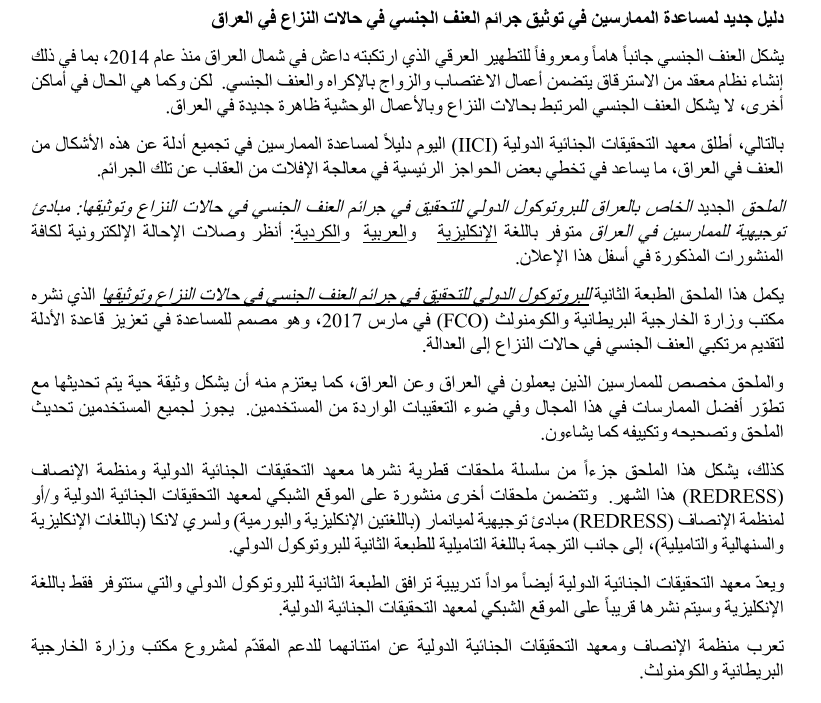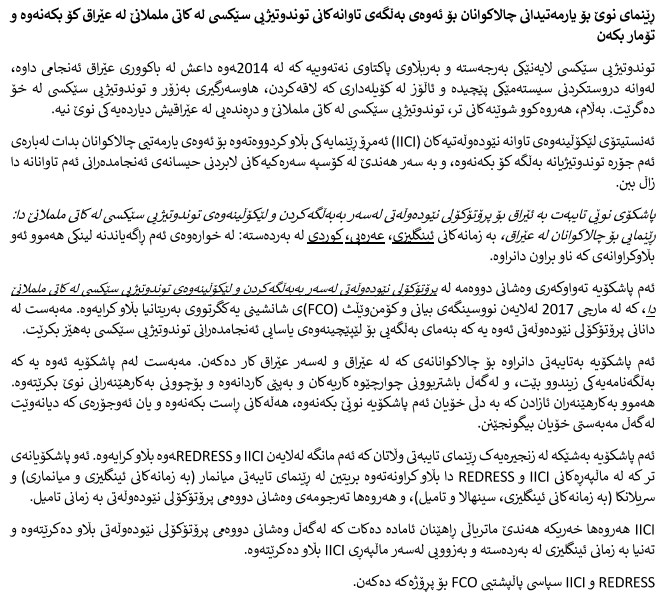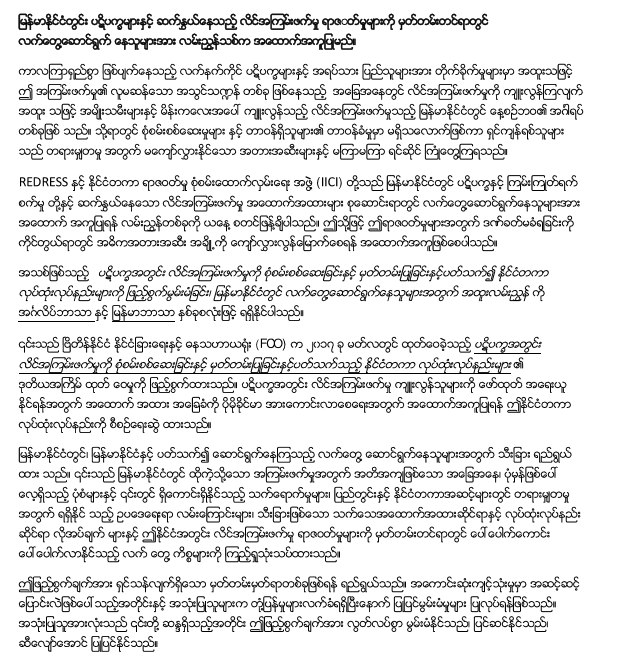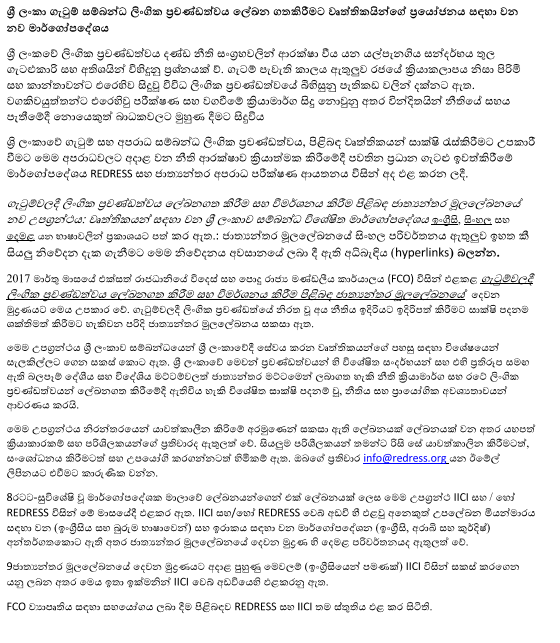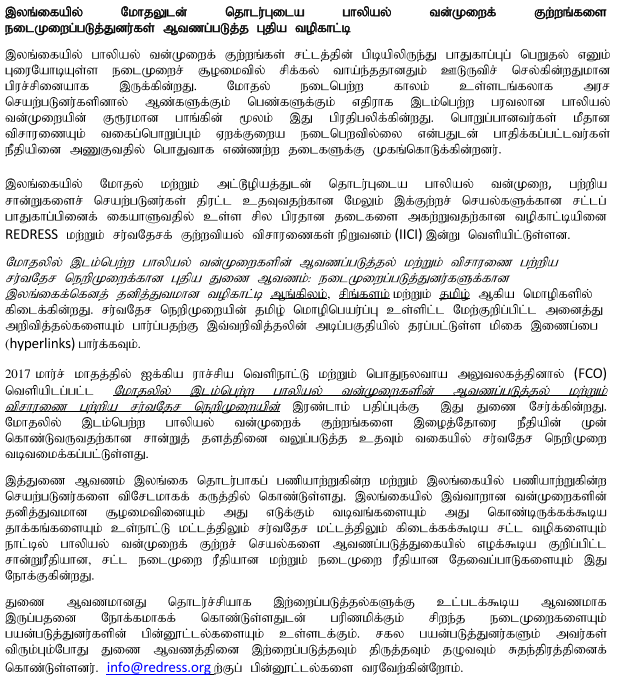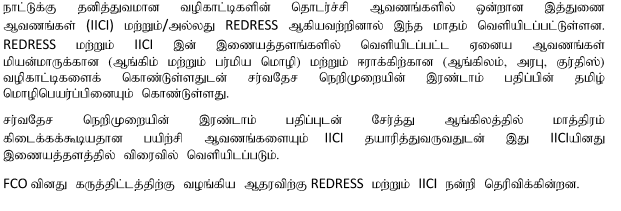Publications and resources
IICI Publications
- In Our Own Words: Survivor Perspectives Resource
- The Open-Source Practitioner’s Guide to the Murad Code
- Guidelines for Using Financial Evidence in the Investigation of International Crimes
- Pilot version of the Open-Source Practitioner's Guide to the Murad Code (April 2025)
- Global Code of Conduct for Gathering and Using Information about Systematic and Conflict-Related Sexual Violence ("The Murad Code"). The Murad Code is available in more than 10 languages.
- IICI guidelines on remote interviewing and PIAC-IICI webinar
- Tool for SGBV-investigation/documentation trainers: training materials accompanying the International Protocol on the Documentation and Investigation of Sexual Violence in Conflict (March 2017 edition)
- IICI Guidelines for Investigating Conflict-Related Sexual and Gender-Based Violence against Men and Boys
- Guide to help practitioners document conflict-related sexual violence crimes in Iraq: Iraq Supplement to the International Protocol on the Documentation and Investigation of Sexual Violence in Conflict: Guidance for Practitioners in Iraq
- Guide to help practitioners document conflict-related sexual violence crimes in Myanmar/Burma: Myanmar/Burma Supplement to the International Protocol on the Documentation and Investigation of Sexual Violence in Conflict: Myanmar-Specific Guidance for Practitioners
- Guide to help practitioners document conflict-related sexual violence crimes in Sri Lanka: Sri Lanka Supplement to the International Protocol on the Documentation and Investigation of Sexual Violence in Conflict: Sri Lanka-Specific Guidance for Practitioners & Tamil translation of the International Protocol (2017 edition)
- ICLS materials: International Criminal Law & Practice, Training Materials for: Bosnia & Herzegovina, Croatia and Serbia. Supporting the Transfer of Knowledge and Materials of War Crimes Cases from the ICTY to National Jurisdictions
Other resources
- Berkeley Protocol of Digital Open Source Investigations
- The Bournemouth Protocol on Mass Grave Protection and Investigation
- New guide on investigating and mapping perpetrators in open-source investigations
- Berkeley Protocol of Digital Open Source Investigations – PDF
- New guide on investigating and mapping perpetrators in open-source investigations
In Our Own Words - Survivor Perspectives Resource
If you investigate, document, monitor, report on or otherwise gather and use information about systematic and conflict-related sexual violence (SCRSV), the way you approach your work can have profound consequences for survivors. Yet survivors are rarely asked about their own experiences of these processes. In Our Own Words: Survivor Perspectives for Those Gathering and Using Information about SCRSV changes that.
Developed by the Institute for International Criminal Investigations (IICI) with survivors and partner organisations around the world, this foundational resource is designed to complement the Global Code of Conduct for Gathering and Using Information about SCRSV (the Murad Code). The Murad Code distils the minimum standards practitioners must uphold to ensure their work is safe, ethical and effective; In Our Own Words emphasises why these standards matter.
By addressing critical questions such as "Why do we speak to you?", "What helps us to open up, and what silences us?", "How does your preparation—or lack of it—impact us?" the insights shared by survivors in this resource demonstrate how assumptions, stigma and bias can cause harm, what respect looks like in practice, and how seemingly small choices affect survivors' lives. Their words have urgent implications for practitioners seeking to gather and use information in a survivor-centred manner.
Read In Our Own Words in English, Arabic, Bosnian, French, Nepali, Spanish, Swahili or Ukrainian. Read the full resource and visit the microsite.
The Open-Source Practitioner’s Guide to the Murad Code
The Institute for International Criminal Investigations (IICI) and the Human Rights Center at the University of California, Berkeley School of Law (HRC) are pleased to announce the publication of the Open-Source Practitioner’s Guide to the Murad Code, a critical new resource designed to support the safe, ethical, and effective digital gathering and use of information related to systematic and conflict-related sexual violence (SCRSV).
Developed in partnership with leading experts, practitioners, and survivors of SCRSV, the companion guide to the Global Code of Conduct for Gathering and Using Information about Systematic and Conflict-Related Sexual Violence (the “Murad Code”) provides actionable guidance for investigators, human rights researchers, journalists, analysts, and civil society organisations that work with online open-source material and may intentionally or unintentionally handle information related to SCRSV.
Practitioners working with open-source information in conflict or human rights contexts, may face numerous scenarios where they encounter material depicting SCRSV, even when not directly searching for it. These scenarios raise urgent questions about consent, data handling and survivor protection. The Open-Source Practitioner’s Guide operationalises the Murad Code's minimum standards through three investigation phases: preparation, investigation and verification, and reporting. It addresses critical issues including:
- Legal and ethical considerations, particularly regarding child sexual abuse material
- Risk assessment and mitigation strategies for physical, digital, and psychosocial security
- Building trauma-aware, survivor-centred investigation protocols
- Data minimisation and responsible preservation practices
- Verification methods that counter bias and misinformation
- Consent considerations for using publicly available information
The Guide is available in English, French, Ukrainian and Arabic.
Guidelines for Using Financial Evidence in the Investigation of International Crimes
The IICI has for some years been raising awareness of the potential impact of financial evidence in bringing to justice those responsible for war crimes, crimes against humanity, genocide and serious human rights abuses. (For the sake of brevity, we refer to these as ‘international crimes’.) This has included providing specialist training across the international investigative landscape, including staff from the International Criminal Court, UN agencies, national police war crimes units and civil society. These Guidelines for Using Financial Evidence in the Investigation of International Crimes (‘the Guidelines’), created by IICI in partnership with contributions from a variety of outside experts, are the next step in creating a broader awareness of the possibilities. The purpose is to highlight the potential importance of financial information in the investigation and prosecution of international crimes and to educate and encourage those starting on the journey. The guidelines are deliberately brief, with more specialist aspects to be covered in annexes, which we will issue subsequently.
Pilot version of the Open-Source Practitioner's Guide to the Murad Code (April 2025)
Developed by IICI and the Human Rights Center at the University of California, Berkeley School of Law, the pilot version of the Open Source Practitioner’s Guide to the Murad Code translates the applicable principles and minimum standards of the Code into standards and practices for practitioners who search for or use online digital open-source information and may intentionally or unintentionally handle information related to systematic and conflict-related sexual violence (SCRSV) during online inquiries or investigations. The aim of the Guide is to help digital open-source investigators, researchers and other information-gatherers recognise and consider critical legal, ethical, human rights and practical issues related to open-source information – and take thoughtful, pre-emptive preparatory actions – in order to avoid harming survivors and others and to ensure that the open-source research work is effective. Practitioners are invited to share feedback on the pilot version by 30 June 2025, via the feedback form on the Murad Code project website.
IICI guidelines on remote interviewing and PIAC-IICI webinar
IICI has developed a 13-page set of guidelines on remote investigative interviewing: IICI guidelines on remote interviewing (see here). The recording of the PIAC-IICI hosted webinar on this topic is available here (in English only). Additional summary information about the guidelines, the PIAC companion publication and the PIAC-IICI webinar is provided a few paragraphs down, underneath the Arabic announcement (PIAC now is called the Justice and Equity Centre.).
Directives IICI sur les entretiens en distanciel et le webinaire organisé par le PIAC-IICI
L’Institut pour les enquêtes criminelles internationales (IICI) a procédé à l’élaboration d’un ensemble de lignes directrices de 13 pages sur les entretiens d’enquête en distanciel. Les voici dans leur version française, sous le titre Directives IICI sur les entretiens en distanciel. L’enregistrement du webinaire organisé par le PIAC-IICI sur cette question est disponible ici (en anglais seulement).
Directrices del IICI para las entrevistas a distancia y seminario web del PIAC y el IICI
El Instituto de Investigación Penal Internacional (IICI) ha elaborado un conjunto de directrices de 13 páginas sobre las entrevistas de investigación a distancia; aquí puede encontrarse la traducción al español: Directrices del IICI para las entrevistas a distancia. La grabación del seminario web auspiciado por el PIAC y el IICI sobre este tema está disponible aquí (únicamente en inglé)
المبادئ التوجيهية لمعهد التحقيقات الجنائية الدولية IICI بشأن المقابلات عن بُعد وندوة مركز الدفاع عن المصلحة العامة – معهد التحقيقات الجنائية الدولية PIAC-IICI عبر الإنترنت
قام معهد التحقيقات الجنائية الدولية IICI بإعداد مجموعةٍ من المبادئ التوجيهية في 13 صفحة بشأن المقابلات عن بُعد؛ وهاهي ذي الترجمة العربية لها: المبادئ التوجيهية لمعهد التحقيقات الجنائية الدولية IICI بشأن المقابلات عن بُعد. يتوفر هنا تسجيلٌ للندوة عبر الإنترنت التي استضافها مركز الدفاع عن المصلحة العامة – معهد التحقيقات الجنائية الدولية PIAC-IICI حول هذا الموضوع (باللغة الإنجليزية فقط).
IICI’s guidelines generally discourage remote interviewing, but also set out guidelines for considering if and how remote interviews could be done ethically, safely, effectively and, in the case of victims or survivors, in a survivor-centric manner. The publication accentuates carefully developed investigation policies, procedures, threat and risk assessments and plans which specifically and in detail address remote interviewing and reflect the input of security, trauma and other experts as an absolute precondition for any remote interview. It covers human rights investigations, documentation, monitoring and reporting (including by NGOs, national investigation authorities, UN commissions of inquiry and other international investigation bodies) and criminal investigations concerning grave human rights violations and international crimes. The guidelines mainly concern investigations that take place in resource-constrained, conflict-affected or similarly challenging contexts and where the interviewer(s) is not in the same location as the interviewee. The guidelines have been developed with the help of experts on international and national human rights and criminal investigations; investigating serious crimes involving children; law; and psychology and psychiatry. These guidelines form a companion piece to the August 2021 publication “Restricted access interviews: a guide to interviewing witnesses in remote human rights investigations”, published by what was then the Public Interest Advocacy Centre (and now is the Justice and Equity Centre). The PIAC publication addresses additional issues, and discusses some topics raised in the IICI publication in more detail.
PIAC & IICI co-hosted a webinar on this topic on 28 September 2021. Moderated by Daniela Gavshon, the speakers and panelists were The Hon Michael Kirby AC CMG, Erin Gallagher, Mohamed Kheir, Shuvai Busuman Nyoni and Philip Trewhitt. The webinar was recorded.
Tool for SGBV-investigation/documentation trainers: training materials accompanying the International Protocol on the Documentation and Investigation of Sexual Violence in Conflict (March 2017 edition)
As part of a 2-year long FCO-supported capacity-building project on documenting sexual violence in conflict, IICI is publishing training materials to accompany the second (March 2017) edition of the FCO’s International Protocol on the Documentation and Investigation of Sexual Violence in Conflict (IP2, Protocol). It is an update of the IICI-prepared training materials which accompanied the first (June 2014) edition of the Protocol.
Written in English, the updated training materials comprise (a) guidance notes for trainers and (b) suggested (PowerPoint) presentations. Trainers can tailor the PowerPoint slides as they wish. (Legal Action Worldwide (LAW) has translated these training materials into Burmese; they can be downloaded at Myanmar: Tool for SGBV-investigation/documentation trainers (Burmese) – Legal Action Worldwide.)
The set of guidance notes includes notes on module objectives, key points for trainers to consider highlighting during each module, the possible duration of each module, and, for some modules, proposed exercises. The set of guidance notes comprises 19 (Word) documents: introductory notes/ cover pages (1 document); 17 separate guidance notes (modules), ie, one for each chapter of the IP2; and a fact scenario for one of the proposed exercises (1 document). The introductory notes and 17 guidance notes are also available in a single, consolidated document (which, however, does not include the module-4 linked fact scenario, which must be downloaded separately).
The set of PowerPoint presentations comprises 17 documents, ie, one module for each IP2 chapter. They reflect the core content of IP2 and the guidance notes, but trainers would have to shorten, extend or otherwise tailor them as necessary.
The primary author of the updated training materials is Danaé van der Straten Ponthoz. Max Marcus and Gabriël Oosthuizen were the primary content advisers and reviewers. The updated training materials used the training materials accompanying the 1st edition of the Protocol (written by Niamh Hayes) as starting point. IICI is grateful to the FCO for supporting the development of this tool.
Guidance Notes:
- Guidance notes for trainers: consolidated version (modules 0-17)
- Guidance notes for trainers: introductory notes (cover pages) (M 0)
Modules:
- Module 1: guidance notes + presentation
- Module 2: guidance notes + presentation
- Module 3: guidance notes + presentation
- Module 4: guidance notes + fact scenario (for exercise) + presentation
- Module 5: guidance notes + presentation
- Module 6: guidance notes + presentation
- Module 7: guidance notes + presentation
- Module 8: guidance notes + presentation
- Module 9: guidance notes + presentation
- Module 10: guidance notes + presentation
- Module 11: guidance notes + presentation
- Module 12: guidance notes + presentation
- Module 13: guidance notes + presentation
- Module 14: guidance notes + presentation
- Module 15: guidance notes + presentation
- Module 16: guidance notes + presentation
- Module 17: guidance notes + presentation
IICI Guidelines for Investigating Conflict-Related Sexual and Gender-Based Violence against Men and Boys
IICI has developed guidelines for investigating conflict-related sexual and gender-based violence against men and boys. They were published in early 2017. The guidelines have been developed for a range of professionals, from international criminal investigators and prosecutors to national police officers, UN human rights officers and local human rights reporters. The guidelines complement existing relevant investigation frameworks and practices, including those that currently focus on conflict-related SGBV against women and girls or children. The guidelines have been integrated in the second (March 2017) edition of the International Protocol on the Documentation and Investigation of Sexual Violence in Conflict (IP2) and the IICI-developed training materials accompanying IP2. The guidelines have been developed with financial support from the Preventing Sexual Violence Initiative of the UK’s Foreign and Commonwealth Office (PSVI) and from IICI’s own pocket.
(Also see the Projects page for information on IICI’s development of guidelines for the investigation of international crimes and serious human rights violations affecting children.)
ICLS materials: International Criminal Law & Practice, Training Materials for: Bosnia & Herzegovina, Croatia and Serbia. Supporting the Transfer of Knowledge and Materials of War Crimes Cases from the ICTY to National Jurisdictions
ICLS (the NGO International Criminal Law Services) provided legal and technical training, advice and support in order to ensure accountability for war crimes, crimes against humanity and genocide. ICLS’ Board of Directors dissolved ICLS with effect from 31 December 2013. Elements of ICLS’ expertise were transferred to IICI. Former ICLS experts, including some members of the ICLS Board of Directors, are now associated with IICI. ICLS’ expertise on providing technical assistance, capacity-building and other advisory and assistance services to prosecutors, judiciaries, governments, inter-governmental organisations, international organisations and others in the area of international criminal justice now resides in IICI. ICLS’ publications, and related intellectual property rights, also now belong to IICI.
Among the ICLS-developed publications is the 2014 published International Criminal Law & Practice, Training Materials for: Bosnia & Herzegovina, Croatia and Serbia. Supporting the Transfer of Knowledge and Materials of War Crimes Cases from the ICTY to National Jurisdictions. It was published as part of the EU-supported OSCE-ODIHR/ICTY/UNICRI Project “Supporting the Transfer of Knowledge and Materials of War Crimes Cases from the ICTY to National Jurisdictions”.
- icls-training-materials-sec-1-introduction1
- icls-training-materials-sec-2-what-is-intl-law2
- icls-training-materials-sec-3-general-principles-of-icl
- icls-training-materials-sec-4-intl-courts
- icls-training-materials-sec-5-domestic-app-of-intl-law
- icls-training-materials-sec-6-genocide
- cls-training-materials-sec-7-cah
- icls-training-materials-sec-8-war-crimes
- icls-training-materials-sec-9-modes-of-liability
- icls-training-materials-sec-10-superior-responsibility
- icls-training-materials-sec-11-defences-and-other-grounds-for-excluding-liability
- icls-training-materials-sec-12-procedure-and-evidence
- icls-training-materials-sec-13-sentencing-and-penalties
- icls-training-materials-sec-14-witnesses-and-victims
Berkeley Protocol of Digital Open Source Investigations
Berkeley Protocol of Digital Open Source Investigations
A Practical Guide on the Effective Use of Digital Open Source Information in Investigating Violations of International Criminal, Human Rights and Humanitarian Law.
The Bournemouth Protocol on Mass Grave Protection and Investigation
New guidance on investigating and protecting mass graves has been published by Bournemouth University in partnership with the International Commission on Missing Persons (ICMP). The Bournemouth Protocol on Mass Grave Protection and Investigation brings together legal rules, and informed practice to support those protecting and investigating mass grave sites.
Mass graves contain evidence that is essential to the realisation of truth, justice and perpetrator accountability. Effective rules and procedures for the protection, maintenance and investigation of mass graves are therefore vital. The Protocol brings together relevant legal guidance and the chronological processes of mass grave protection and investigation to support and inform practitioners. These could include government and state officials, legal personnel and forensic experts.
The Bournemouth Protocol is free to access here
The Protocol is also available in the following translations (see also project website: https://www.bournemouth.ac.uk/research/projects/mass-grave-protection-truth-justice)
Arabic
Bosnian
Dari
French
Georgian
Kurdish
MY Burmese
Portuguese
Russian
Simplified Chinese
Spanish
Swahili
New guide on investigating and mapping perpetrators in open-source investigations
The Public Interest Advocacy Centre (PIAC) in Sydney and the Human Rights Center (HRC) at the University of California, Berkeley School of Law have developed a ground-breaking guide to support investigation of international human rights violations.
Investigating Perpetrators provides practical guidance for investigators on how to use open-source data to comprehensively map potential perpetrators of human rights violations and related crimes. Understanding the structure of security forces, roles within various units and their location over time is a powerful tool to support accountability processes, including criminal prosecutions, civil cases, vetting processes and sanctions.
The guide sets out a methodology for collecting, organising and analysing the copious open-source information available regarding alleged war crimes and mass human rights violations. Investigators can use the methodology to create a powerful information map of parties’ activities through time and across geographic regions.
Open-source mapping can also provide valuable insight into time periods or locations where there has not been wide or accurate reporting of events, and where more investigations are necessary to address information gaps.
Access the guide here: New guide on investigating and mapping perpetrators in open-source investigations
